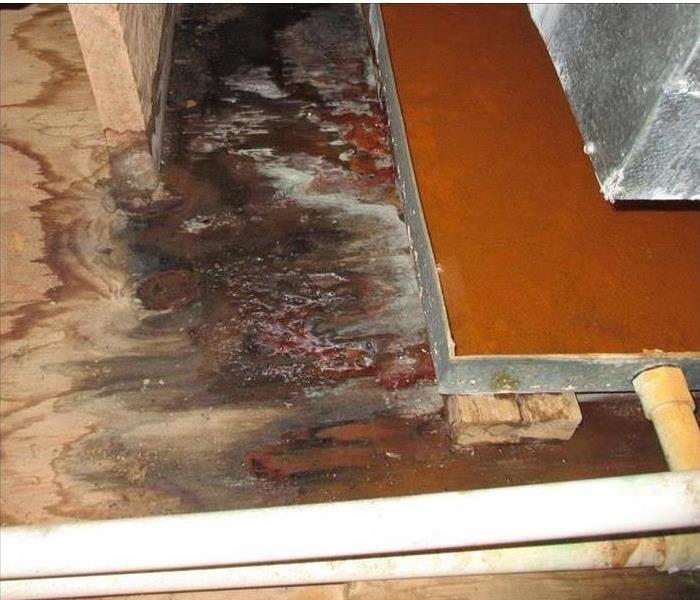What Can I Do to Prevent HVAC Water Damage in My Home?
7/6/2022 (Permalink)
 SERVPRO can mitigate your Wilmington home water damages. We use the most updated equipment out there.
SERVPRO can mitigate your Wilmington home water damages. We use the most updated equipment out there.
SERVPRO Professionals Mitigate HVAC System-Related Water Damage in Wilmington Residences
Water damage claims over the last five years have averaged almost $8,000. Based on Insurance Information Institute data, they are the second most common form of property damage. Wilmington homeowners can identify and rectify water damage quickly in many cases. However, some incidents, especially relating to areas of the home that require professional servicing like HVAC systems, need a licensed team to handle the cleanup.
SERVPRO is a team you can count on for HVAC water damage cleanup in Wilmington at any time of the day or night, including weekends and holidays. If areas of your home require further restoration after cleanup, your local SERVPRO is licensed to render general and residential contracting services (license #1992104829).
How to SERVPRO Tools Remove Home Water Damage?
- Extraction equipment is more efficient than drying alone. Extracting water with specialized tools is as much as 500 times more effective than relying solely on structural drying for water damage mitigation.
- Calculated placement of air movers and dehumidifiers prevents secondary damages. SERVPRO techs are trained to do the following in a water damage situation:
- Carefully measure the moisture content of affected surfaces.
- Extract moisture without
- Calculate placement for air movement and dehumidification equipment
- EPA-registered antimicrobials eliminate mold risk. Sanitation is another critical element of water damage mitigation that removes mold and mildew risk while rectifying odors. Many sanitation and deodorization methods are available, including sprays, fogging, manual cleaning, and injection systems for carpeting.
Tips for Changing Your HVAC Filters
- How does changing the filter prevent water damage? Regular filter changes are not only beneficial for your indoor air quality. This routine maintenance task can also prevent your air conditioning from overworking to maintain comfortable temperatures in your home. An overworked air conditioning system can freeze and then defrost moisture on the evaporator coils, creating water damage in your Wilmington home’s HVAC system.
- How often should you change your filter? This can vary based on your filter and what is needed for your specific HVAC system. Typical replacement intervals for filters are monthly and semi-annually.
- A factor that affects how often you need to replace your filter is how frequently you use your HVAC system. Prevent HVAC issues by checking on your filter regularly before replacing it.
- What type of filter should you use? High-efficiency particulate air (HEPA) filters to set the standard for high indoor air quality. Check the manual for your system to determine the specific type of filter you need. Depending on the filter’s placement, a professional may need to change the filter for you. Call a trusted contractor for filter changes if it is located in your furnace or air handler.
Maintenance Tasks for Your Condensation Drain Line
The condensation drain line is another area where water damage can develop. Here is what you can do to lower the risk of this happening:
- Check the line opening while your AC runs to ensure water flows to the drain. The level of flow is contingent on the humidity levels in your home.
- Is the pipe appropriately oriented? A drain line that is out of alignment can cause water damage.
- Are both the drain and emergency drain lines adequately connected and installed? Mechanical failures can stem from even minor deviations from manufacturer instructions. Double-check the drain lines to ensure nothing is out of place or damaged.
- Clear out the AC drainage holes regularly. That can be done with something as simple as a paperclip. Poke the drainage hole at the cabinet’s base, typically located underneath the evaporator fins. Clearing out these drainage holes prevents water from accumulating and damaging your system.
- Flush out the drain line once or twice a year with an algaecide, inhibiting algae and mold growth in your HVAC system. Commercial solutions and bleach are both useful for this purpose.
SERVPRO Restores Your HVAC System
SERVPRO technicians can handle a variety of cleanup and restoration tasks for your HVAC system and surrounding structural materials, including:
- Partial disassembly of sheet metal vents for thorough disinfection with EPA-registered antimicrobials.
- Coated fiberboard and flex duct vents may require removal after water damage exposure and are typically more cost-effective to replace than repair.
- The insulation lining your vents can also be examined and replaced.
SERVPRO of Hockessin / Elsmere is only a phone call away from rendering mitigation services that are Faster for Any Size Disaster. Call (302) 992-0104 for professional cleanup that comes when you need it.






 24/7 Emergency Service
24/7 Emergency Service